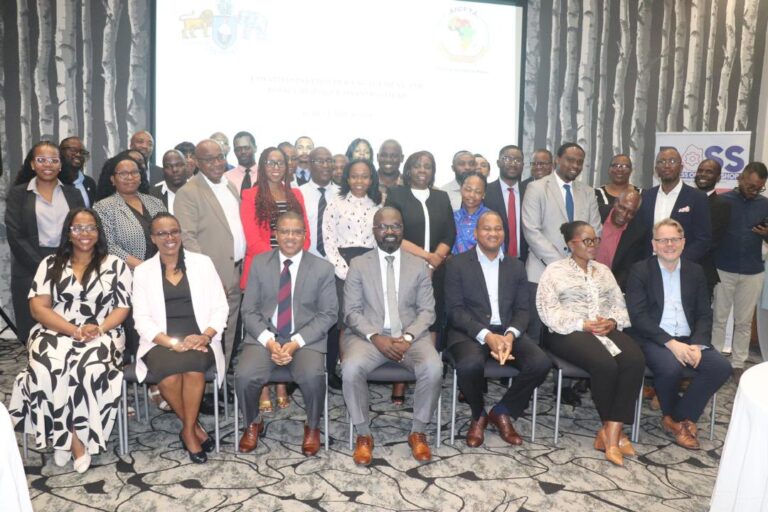I. RECs and AfCFTA – Regional Trade as the Path to Prosperity
Decades ago, Africa’s political leaders recognized, with foresight, that regional integration and trade are a powerful path to achieving prosperity. They established eight Regional Economic Communities (RECs) that became the regional building blocks of the African Union and, ultimately, the African Continental Free Trade Agreement (AfCFTA).
Today, the African Union recognizes the following RECs: the Economic Community of West African States (ECOWAS), created in 1975, the Arab Maghreb Union (UMA), the Common Market for Eastern and Southern Africa (COMESA), the Community of Sahel-African States (CEN-SAD), the East African Community (EAC), the Economic Community of Central African States (ECCAS), the Intergovernmental authority on Development (IGAD), and the Southern African Development Community (SADC).
While the RECS began the journey to a rules-based intra-African trade regime, a wider continental approach remained necessary. The African Continental Free Trade Agreement was signed on March 21, 2018 as a free trade area of 54 of Africa’s 55 countries and a population of 1.3 billion people. It is the world’s largest free trade area, with the main purpose of progressively reducing the steep tariff barriers and trade costs that have for decades prevented the growth of trade and prosperity within the continent. Trading across borders under the terms of the AfCFTA began on January 1, 2021. As of August 2023, 47 out of 54 African countries have ratified the treaty. When fully implemented, the AfCFTA will boost intra-African trade by 52%, lift 30 million people out of poverty, and increase the continent’s GDP by USD 450 billion by 2035.
The envisaged quantum leap from the impact of AfCFTA is not misplaced: Africa trades far less within itself than other continents. It is no accident that these continents are the wealthiest in the world: 70% of Europe’s trade is within Europe. 59% of Asia’s, and 30% of North America’s trade is intra-regional. In contrast, only 16% of Africa’s global trade is within Africa.
II. ROLE OF PRIVATE SECTOR AND GOVERNMENTS
These targets simply cannot be achieved without the private sector. While governments have signed and ratified the AfCFTA, it is companies and business enterprises that trade across Africa, far more than governments. This means that the African private sector must be strengthened to leverage the provisions and protocols of the AfCFTA to expand intra-African trade to create prosperity.
Two critical conditions must be met. The first is an understanding across all stakeholder groups of the balance between the state and the markets in wealth creation. While it ultimately is the private sector that will directly unlock prosperity for Africa, and Africans are broadly enterprising people, the truth is that without effective governments, governance and public policy, they can’t. Every prosperous country has a competent, effective state as a backdrop.
The second is to lay the foundation within national economies in Africa for the progressive implementation of the AfCFTA. This means that enabling business environments for trade and investment must be created to actualize the protocols of the RECs and the AfCFTA.
III. AFRICA PRIVATE SECTOR SUMMIT AND THE PRIVATE SECTOR BILL OF RIGHTS
This is where the role of the Africa Private Sector Summit (APSS) comes in. A pan-African, private sector-led organization, the mission of the APSS is to promote trade and investment across Africa through an enabling business environment. We work through an ecosystem approach in which we collaborate with other entities such as the Pan-African Chamber of Commerce and Industries (PACCI), the African Business Council (ABC), and the Africa Education Trust Fund (AETF) to leverage the private sector’s ability to drive trade and investment in our continent.
Specifically, to help achieve an enabling environment for business in the continent, APSS is engaging with African governments and other relevant parties for the adoption by all African countries of a Charter on the Private Sector Bill of Rights (PSBoR) for an Enabling Business Environment. The Private Sector Bill of Rights contains 24 specific rights. These rights include the rights to easy establishment of businesses, a conducive legal framework for business, infrastructure, peace and security, and consultative relationships between governments and businesses in the making of regulations that govern or affect business.
The adoption of the Private Sector Bill of Rights will fast-track the actualization of the key Framework Protocols of the AfCFTA. These protocols are :
- Tariff reductions
- Liberalize trade in services progressively
- Cooperate on investment, Intellectual Property Rights and competition policy
- Cooperate on all trade related issues
- Cooperate on customs matters and the implementation of trade facilitation measures
- Establish dispute settlement mechanism
- Establish and maintain an institutional framework for the implementation of the AfCFTA (the AfCFTA Secretariat – already done, and headed by Secretary-General Wamkele Mene).
Our goal is to have the Charter on the Private Sector Bill of Rights adopted by at least 22 African countries, but preferably all countries on the continent that are members of the 55-Member State African Union, as well as by the Pan-African Parliament, and then adopted at the Summit of the Heads of State and Government of the African Union. We will seek adoption by national parliaments and/or the Executive branches of government.
We are walking a similar path as that which led to the successful adoption of the AfCFTA. The specific rights identified in the Private Sector Bill of Rights come from the protocols of the RECs and AfCFTA. The PSBoR is intended as an essential companion instrument to the AfCFTA treaty, one that domesticates the continental trade agreement inside national governments, private sector governing and coordinating entities, and in the operations of the African marketplace in reality.
I believe that the Private Sector Bill of Rights when adopted by African countries and alongside the RECs and AfCFTA, addresses a fundamental conundrum that has confronted post-colonial Africa for decades: why have market-oriented economies created broad-based wealth in Europe, North America and increasingly in Asia, but poverty remains high in the vast majority of African countries? Breaking this jinx is the goal of the AfCFTA and the African Union’s vision 2063 – The Africa We Want.
We already know that the relatively low level of intra-African trade is part of the answer. But just as fundamental is the potential role enabling business environments in the continent secured via the Private Sector Bill of Rights can play in achieving the three fundamentals of all successful market economies. These fundamentals (a) property rights, (b) innovation, and (c ) access to capital.
The PSBoR guarantees, amongst other rights, the right to favorable credit terms to support short, medium and long term investment projects as well as trade credit supported by the Africa Trade Insurance. It also guarantees the right to benefit from scientific progress (innovation), and the right to local content in intellectual property.
IV. THE AFREXIMBANK AND AfCFTA
We cannot conclude a discussion on the Private Sector Bill of Rights in the context of the RECs and AfCFTA without noting the linkage with the African Export Import Bank (Afreximbank), the official host of the 2023 Intra-African Trade Fair and the grand convener of our presence in Cairo today.
Afreximbank, founded in 1993, is Africa’s trade finance Bank. I was privileged to have been invited by Professor Benedict Oramah, the bank’s President, to deliver the bank’s 30th Anniversary Founders Day Lecture in Cairo six months ago on May 8, 2023.
There are two reasons why the link between Afreximbank’s work and the APSS’ Africa Private Sector Bill of Rights matter greatly. First, the bank has played a pivotal role in the financing of trade in Africa. But without an AfCFTA, the bank was providing finance without the support of a continent-wide institutional framework for intra-African trade. The existence and work of AfCFTA has cured this defect, and expanded the potential impact of intra-African trade at a massive scale. The bank has already introduced two game-changing products to make free trade across Africa real and easier: its AfCFTA Adjustment Fund aimed at the reduction of tariffs in intraday-African trade, and the Pan-Africa Payment Settlement System (PAPSS) that now makes it possible for traders to transact across African borders in their own national currencies. These new realities make the Africa Private Sector Bill of Rights even more imperative.
Second, Afreximbank is a public-private partnership institution. Uniquely, it is both an international organization with full diplomatic status and a financier of private sector and SME enterprises. There is therefore a large scope for a strengthened partnership between the bank and the Africa Private Sector Summit on the Private Sector Bill of Rights to provide an enabling environment for the businesses that Afreximbank supports.
V. CONCLUSION
Trade, business and economies in general cannot grow sustainably, create wealth and lift millions from poverty without strong, predictable enabling business environments. This is the value proposition of the Africa Private Sector Summit’s proposed Charter on the Private Sector Bill of Rights. As I hope that I have demonstrated, the PSBoR is an indispensable compliment to Africa’s Regional Economic Communities and the potentially transformative AfCFTA Treaty.
The Private Sector Bill of Rights, when adopted, will provide many practical benefits to varied stakeholders including governments, stock exchanges, African businesses, development partners, and the continental and global publics. Thriving businesses pay taxes to rhe government, increasing revenues. Similarly, a thriving private sector generates listings and sustainability of capital markets. Productive economies with skilled, well educated labor forces will position Africa to join the 4th Industrial Revolution.
In short, the complimentarity of the Private Sector Bill of Rights to the RECS and the AfCFTA equals an Africa that is truly open for business!
Source: All Africa


